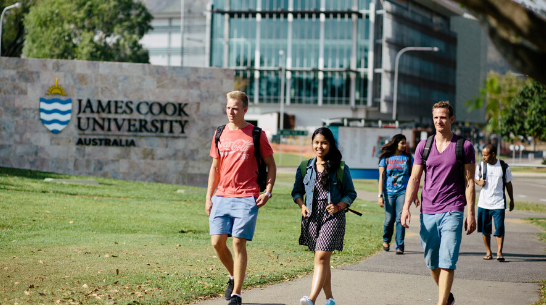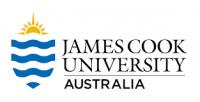Master of Marine Biology
Develop a comprehensive knowledge of marine biology as well as a diverse skill set with this interdisciplinary marine biology degree. Participate in specialised, hands-on training in unmatched locations like the JCU Orpheus Island Research Station on the Great Barrier Reef. Gain extensive experience in research methods and data and laboratory analysis while honing your data science and communication skills to bring your practise and research to the next level. Prepare for your future career through internships within government agencies and research institutions involved with the stewardship of UNESCO World Heritage listed coral reefs and other extraordinary environments like mangrove forests and the deep sea.
Gain advanced knowledge and experience in the five areas that are most sought after by marine sector employers: marine biology, mathematics/statistics/modelling, environmental science and management, marine and microbial ecology, and cross-disciplinary studies. Enhance your research capabilities with the advanced research skills embedded in all subjects of the degree. Pursue your passion for discovery through the Master of Marine Biology’s Research major or gain valuable hands-on experience during a three-month workplace internship with one of JCU’s leading industry or government partners.
Go deeper into the areas of marine biology that spark your passion as you explore topics such as quantitative marine ecology, conservation biology, fisheries, and the biology, life history and taxonomy of tropical marine organisms. You will study tropical marine systems with an emphasis on coral reefs and surrounding waters, seagrass meadows, mangrove assemblages and the adjacent sandy and rocky shores.
JCU is a university for the Tropics, a region that is home to 80 per cent of the world’s terrestrial species and over 90 per cent of its mangroves and reef-building corals*, meaning your studies will equip you with the knowledge and skills to promote the conservation of the majority of the world’s biodiversity. Gain in-depth experience through field trips, laboratory-based classes, research projects and professional internship opportunities through JCU’s unique access to learning environments including the JCU Orpheus Island Research Station, the new Technology and Innovation Centre at the JCU Townsville, Bebegu Yumba campus, Douglas, the Marine and Aquaculture Research Facility (MARF), as well as the Advanced Analytical Centre (AAC) and high performance super computer.
As you study the Master of Marine Biology at JCU, you’ll get to sharpen your skills with researchers from Centres of Excellence such as the ARC Centre of Excellence for Coral Reef Studies, Centre for Tropical Water and Aquatic Ecosystem Research (TropWATER), and Centre for Sustainable Tropical Fisheries and Aquaculture (CSTFA). At JCU Townsville, you will also study and research in JCU’s The Science Place, the first educational facility in Australia to achieve the LEED Gold certification for its environmentally sustainable design.
Build networks with students from all around the globe who study marine biology at JCU as well as the internationally renowned industry experts you’ll encounter through work integrated learning opportunities and the optional three-month internship. Be part of a tight knit community of marine scientists who call North Queensland home — global researchers and specialists across a range of sectors working together on important projects at the forefront of marine science, such as new technologies for coastal ecosystem mapping, reef regeneration projects, and citizen science projects like The Great Reef Census. Townsville is the world’s second most-prolific city for research related to the United Nation’s Sustainable Development Goal number 14, Life Below Water.**
In the three-month internship option, you can gain professional experience in conservation science, environmental management, fisheries, eco-tourism, science communication, big data, or policy development. You will be mentored by industry experts as you apply your knowledge and skills on real-world challenges throughout this work experience. Get prepared for your dream career in marine science by developing the networks, skills and experiences that will lead to employment opportunities post-graduation. You will intern with leading organisations located in Townsville, further afield in Australia, or internationally.
If you opt for the research major, at the outset of the second year of your Masters you will have the opportunity to undertake a year-long research project on the topic of your choice. Course coordinators will help you make connections with supervisors (internal and/or external). Some students choose a project with co-supervision with JCU academic staff and an industry partner, such as the Commonwealth Scientific and Industrial Research Organisation (CSIRO), the Australian Institute of Marine Science (AIMS) and JCU’s Centre for Tropical Water and Aquatic Ecosystem Research (TropWATER). Popular research topics include the biology and ecology of marine organisms and factors influencing habitat. Entry to the research major will require you to have a topic chosen and supervisor confirmed by the end of your first year of study.
Graduate with confidence in tropical Australia, on the shores of the Great Barrier Reef, where graduate employers and key research end-users are seeking out marine biology experts who can contribute to conserving and improving tropical ecosystems and societies. Studying and working in North Queensland will have you operating in a hub for marine sciences with many employers and research bodies, including the Australian Institute of Marine Science (AIMS) and the Great Barrier Marine Park Authority (GBRMPA).
Campus Information
Townsville
The campus is located in the Townsville Tropical Intelligence and Health Precinct (TropiQ) in the suburb of Douglas. JCU Townsville is set in a 386-hectare natural bush and parkland setting, 13 kilometres (8 miles) from the Townsville CBD.
Intakes
- Feb
- July
Application Processing Time in Days: 20
Application Process
Minimum English Language Requirements
| English Level Description | IELTS (1.0 -9.0) | TOEFL IBT (0-120) | TOEFL CBT (0-300) | PTE (10-90) | |
|---|---|---|---|---|---|
| Expert | 9 | 120 | 297-300 | 86-90 | |
| Very Good | 8.5 | 115-119 | 280-293 | 83-86 | |
| Very Good | 8 | 110-114 | 270-280 | 79-83 | |
| Good | 7.5 | 102-109 | 253-267 | 73-79 | |
| Good | 7 | 94-101 | 240-253 | 65-73 | |
| Competent | 6.5 | 79-93 | 213-233 | 58-65 | |
| Competent | 6 | 60-78 | 170-210 | 50-58 | |
| Modest | 5.5 | 46-59 | 133-210 | 43-50 | |
| Modest | 5 | 35-45 | 107-133 | 36-43 | |
| Limited | 4 | 32-34 | 97-103 | 30-36 | |
| Extremely Limited | < 4 | < 31 | < 93 | < 30 |
Job Opportunity Potential
Experience gained through life and work may make you eligible to start studying a JCU degree.
Employment is assessed on the level of skill required for the job and your length of service. A minimum of six months full-time equivalent paid employment is required. This can be with one employer or more. Your employment does not need to be relate to the course you are applying for. Be sure to include details of your employment in your application
PSW Opportunity
- 4 years
Admission Requirement / Eligibility Criteria
- Course Code: 107243C
- Course Type: Full Time
- Course Level: Masters/PG Degree
- Duration: 02 Year
-
Total Tuition Fee:
89680 AUD
Annual Cost of Living: 24505 AUD
Application Fee: N/A
Similar Programs
- Master of Public Health - Master of Global Development at James Cook University
- Master of Professional Psychology at James Cook University
- Master of Clinical Exercise Physiology at James Cook University
- Master of Data Science (Professional) at James Cook University
- Master of Public Health and Tropical Medicine at James Cook University
- Master of Psychology (Clinical) at James Cook University

